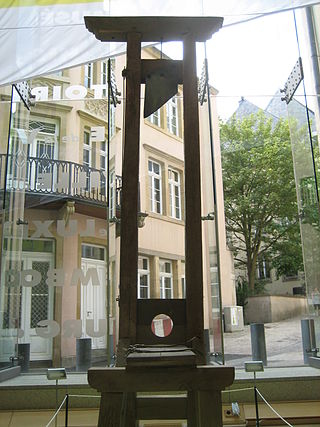
Capital punishment in modern Greece was carried out using the guillotine or by firing squad. It was last applied in 1972 during the military junta. The death penalty was abolished in stages between 1975 and 2005.

Capital punishment in Latvia was abolished for ordinary crimes in 1999 and for crimes committed during wartime in 2012. Latvia is party to several international instruments which ban capital punishment.
Capital punishment in Turkmenistan was originally allowed under Article 20 of the 1992 Constitution, where it was described as "an exceptional punishment for the heaviest of crimes". In December 1999, a presidential decree abolished capital punishment "forever".
Capital punishment in Tajikistan is allowed by Article 18 of the 1999 Constitution of Tajikistan, which provides:
"Every person has the right to life. No person may be deprived of life except by the verdict of a court for a very serious crime."
Capital punishment is no longer applied in San Marino: the last execution was carried out in 1468 or in 1667, by hanging.

Capital punishment in Luxembourg was abolished for all crimes in 1979.
Capital punishment in Angola was abolished by constitution in 1992. In 1977, the country carried out its last executions, which were of Nito Alves and many of his supporters, who were convicted of treason. The execution method in Angola was by firing squad. Angola signed the Second Optional Protocol to the International Covenant on Civil and Political Rights on September 24, 2013, and ratified it on October 2, 2019. Angola voted in favor of the UN moratorium on the death penalty in 2007, 2008, 2010, 2012, 2014, 2016, 2018, and most recently in 2020.
Capital punishment in Chile is legally sanctioned, albeit with significant limitations. Since its abolition for civilian offenses in 2001, its application has been restricted to military personnel convicted of war crimes and crimes against humanity committed during wartime. This places Chile among the seven countries globally that have abolished capital punishment solely for ordinary crimes.
Capital punishment is a legal penalty in El Salvador. It was abolished in 1983 by Article 27 of the constitution, with an exception allowed for crimes committed under military law during a state of international war. Because of this, El Salvador is one of seven countries considered "Abolitionist for Ordinary Crimes," along with Brazil, Burkina Faso, Chile, Guatemala, Israel, and Peru. El Salvador last carried out an execution in 1973.
Capital punishment has been abolished in Bolivia and is no longer a lawful punishment in the country. It was abolished for ordinary crimes in 1997, and for all crimes in 2009. Bolivia's last execution was of Melquiades Suxo on 30 August 1973.
Capital punishment was abolished in Burundi on 24 April 2009. Burundi is not a state party to the Second Optional Protocol to the International Covenant on Civil and Political Rights.
Capital punishment was abolished in the Republic of the Congo in 2015. The country carried out its last execution in 1982. Before the abolition of the death penalty, the Republic of the Congo was classified as "Abolitionist in Practice." The Republic of the Congo is not a state party to the Second Optional Protocol to the International Covenant on Civil and Political Rights.
Capital punishment in Gabon was officially abolished for all crimes in 2010. Gabon's last execution took place in 1985. Prior to abolition, Gabon was classified as de facto abolitionist, or "abolitionist in practice," due to the length of time since their last execution.
Capital punishment was abolished in Guinea. The civilian death penalty was abolished in 2016. It was abolished under military law in 2017. Guinea carried out its last execution in 2001. Prior to its abolition for ordinary crimes in 2016, Guinea was classified as retentionist.
Capital punishment was abolished in Guinea-Bissau in 1993. The country carried out its last execution in 1986. In February 1993, the National People's Assembly (Guinea-Bissau) passed an amendment to the constitution which abolished the death penalty for aggravated murder and treason.
Capital punishment was abolished in Madagascar in 2015. The last execution in Madagascar was carried out in 1958. Prior to de jure abolition, Madagascar was classified as "Abolitionist in Practice."
Capital punishment was abolished in Mauritius in 1995, following the adoption of the Abolition of Death Penalty Act 1995. The last execution was carried out in Mauritius in 1987.
Capital punishment was abolished in Senegal in 2004. The country carried out its last execution in 1967.
Capital punishment was abolished in Togo in 2009. The country carried out its last execution in 1978. Prior to the death penalty's de jure abolition, Togo was classified as "Abolitionist in Practice."
Ethiopia retains capital punishment while not ratified the Second Optional Protocol (ICCR) of UN General Assembly resolution. Historically, capital punishments was codified under Fetha Negest in order to fulfill societal desire. Death penalty can be applied through approval of the President, but executions are rare.


